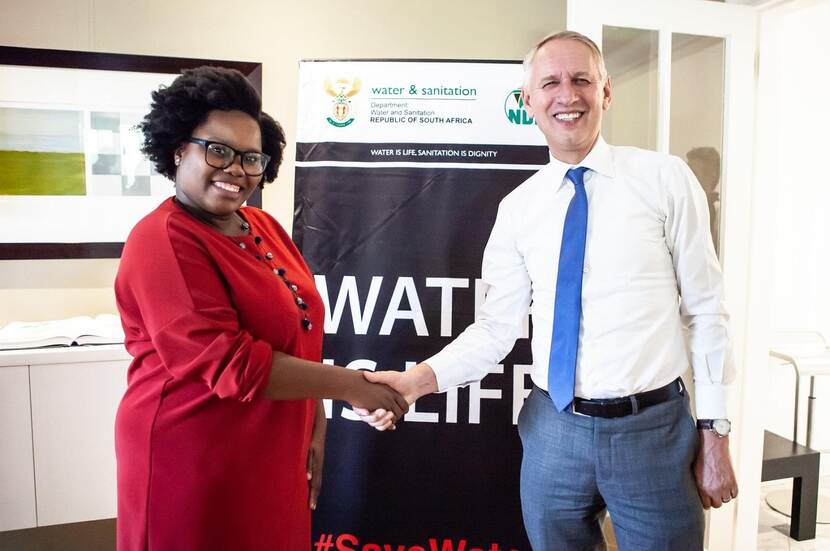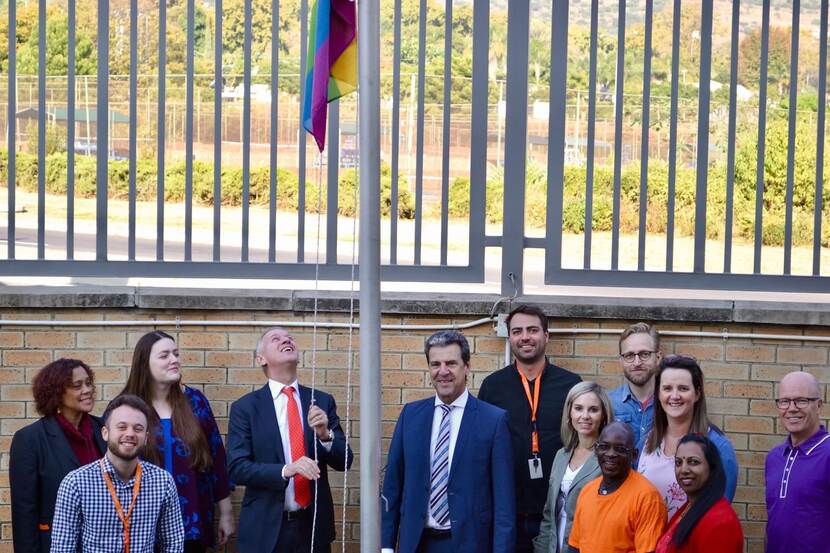‘South Africa is being cut off during the busiest month of the year'
Han Peters was working at the embassy in South Africa when Nelson Mandela was freed from prison. Thirty years later he has returned as ambassador to an entirely new situation. The new coronavirus variant is causing great concern, and the travel restrictions couldn’t have come at a worse time. The impact is huge.

You’ve been the Dutch ambassador to South Africa for nearly three years now. How would you describe the country?
‘I see South Africa as a land of opportunity, but also of challenges. It became a democracy in 1994, which was a political transformation – but I think a lot still needs to be done before it can achieve an economic transformation. A quarter of a century has passed since the first free elections, but too many South Africans still live in poverty. Tackling poverty, unemployment and inequality remains the biggest challenge. These issues are also responsible for the high crime rate.
‘On the other hand, the country has a great deal of potential. Its population is young: most South Africans are under 24 years of age. Opportunities exist in the field of renewable energy, especially hydrogen. But there are also challenges. What hasn’t helped is the damage done to the government and public bodies by “state capture” in the era before the current president took office. These activities are currently under investigation in South Africa, and trials are taking place. The new president clearly has good intentions, but of course it will take time to rebuild a country that has been systematically neglected.’
How are South Africa and the Netherlands working together to tackle challenges and take advantage of opportunities?
‘I often think that social partners in this country should get together more frequently to look for solutions. Businesses and the government don’t seek each other out often enough. In the Netherlands we try to bring the public and private sectors together when facing big social challenges, and that seems to work well. I think we’ve been reasonably successful in that. I don’t want to suggest that you can just transplant solutions from one place to another, though. The crucial element here is trust. Entering into dialogue with South African counterparts about forms of public-private partnership like that is an initial step.
‘We’re also one of the biggest investors in this country, generating a lot of economic activity, which creates jobs. Another area we can help in is climate action. The port of Rotterdam wants to become a hub for sources of renewable energy. So we’re looking at way to work with South Africa to provide the rest of Europe with access to hydrogen and energy via the port of Rotterdam. That’s a clear win-win situation. Agriculture is another important sector. So there are many areas in which we can collaborate.’
If you had the chance to give South Africans a typically Dutch tip, what would that be?
‘Be pragmatic when looking for solutions and don’t trying to sew everything up with rules and bureaucracy. In the Netherlands we often work with voluntary agreements between government and the private sector. If you sit down together to try and solve issues collectively, all the parties will be more inclined to accept the outcome. That tends to be more effective than promulgating yet another law. There are a lot of rules and regulations here, but often no one knows why they exist. That gets in the way of solving problems. So I’d say, think more in terms of solutions, and less of restrictions and rules.’

What achievements from the last three years are you particularly proud of?
‘One of the most important issues at the moment is climate change. South Africa is still reliant on coal for 85% of its energy supply. The market for coal is shrinking, and more and more countries are converting to renewable energy. South Africa, too, will have to make this transition. But with unemployment now at 34%, the prospect of massive layoffs in the coal sector is not a pleasant one. So one of the things we’re doing now is a small pilot with Dutch agricultural businesses, to explore interest to invest in areas around coal-fired power stations that are about to close. It’s a small project, but it could have a powerful effect as an example of good practice – a way of combating the loss of jobs in the impending energy transition and of providing job prospects in the future.
What’s more, South Africans are increasingly realising that they could become a major player in the field of hydrogen. The first hydrogen projects are already being set up. At the COP26 climate conference an agreement was reached to earmark $8 billion from international funds to help South Africa move away from coal more quickly. These are important steps.’
How big is the impact of the pandemic on the work of the embassy and on South Africa?
‘COVID is a huge problem for South Africa. The country’s economy is structurally underperforming. There’s great inequality and very high levels of unemployment. The emergence of COVID and the hard lockdown measures taken to combat it have only exacerbated these problems. The informal sector has been hit particularly hard, with millions of people losing their jobs. The social safety net doesn’t amount to much here: maybe €20 or €30 a month. So the ban imposed by many countries on flights from South Africa couldn’t have come at a worse time. The country is being cut off in the busiest month of the year, December, which is high season in the tourist sector. The impact is huge.
‘Last year we partnered with KLM to repatriate around 17,000 people to the Netherlands and other countries in Europe. We were alone in being able to ensure weekly flights from South Africa, even during the hard lockdown. As an embassy, we played an important part, because the South African government would only allow flights if people first assembled at the embassy in Pretoria or the consulate in Cape Town as a kind of pre-check-in. So for six months we helped 400 people return home every weekend. That secured us a lot of goodwill. It was also a nice way to help both Dutch citizens and Dutch businesses.’
What effect do you see of the 400 years of shared history between the Netherlands and South Africa?
‘That shared narrative has two sides that make our work interesting. On the one hand South Africans see us as a country that championed efforts to fight apartheid. I grew up in the 1970s, when Dutch society as a whole was appalled by the apartheid system. On the other hand, we’re also viewed as the country of Jan van Riebeeck and the Dutch East India Company, so some see us as laying the foundations for apartheid. So there are two sides to the coin.
‘The theme “transformation and identity” is a spearhead of both our embassy’s work plan and our multi-year strategy. Alongside cultural collaboration in areas like the modern creative industry, we also want to enter into dialogue about the uncomfortable aspects of our shared history. We try to foster this by showing an open attitude.’